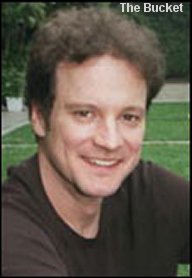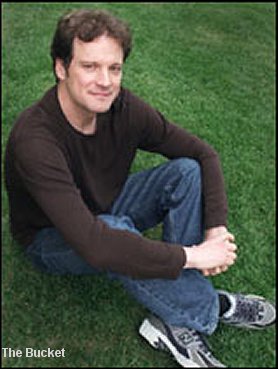Right, that Colin Firth, the guy in "Valmont" and "Shakespeare in Love." The man whose screen alter-egos have never encountered an unstarched collar, played "a feckless drifter, a bit of a slob." No, really, he did. "It was interpreted as a reach for me," recalls the 41-year-old Firth. "The life of the guy I was interpreting was very close to my own. I was playing someone my own age who lived in the same postal district that I live in, who supports the same soccer team that I support, and who speaks in very much the same vernacular that I and my friends would speak in. "Whereas it wasn't considered a reach to play the richest man in England who rides around on horses with thousands of servants, and commands thousands of acres of estate." That would be Mr. Darcy, the icy but good-hearted hero of Jane Austen's "Pride and Prejudice" that Firth played most famously in a 1995 BBC miniseries. Last year, in a kind of casting slam dunk, he played Mark Darcy, a stuffy lawyer in the film adaptation of Helen Fielding's "Bridget Jones's Diary." The fictional Jones—a "Pride and Prejudice" fan—had openly lusted after Firth as Darcy in her two novels. One of the 50 Speaking of lusting, not long after the film came out last year, Firth was named one of People Magazine's 50 most beautiful people. Now Firth is back in suits and lush acreage in Oliver Parker's adaptation of Oscar Wilde's "The Importance of Being Earnest." Playing Jack Worthing, the love-struck gentleman in search of a name and an identity, he's the straight man to Lady Bracknell (played in the film by Judi Dench) and her debt-riddled nephew Algernon Moncrieff (Rupert Everett). Through an elaborate ruse, Jack takes on the name Ernest Worthing in order to be able to visit London. There he falls in love with Lady Bracknell's daughter, Gwendolen Fairfax (Frances O'Connor), who is convinced she must marry a man named Ernest. Back in the country, Jack has a beautiful young ward named Cecily (Reese Witherspoon), an enormous estate and—big surprise, since Firth is playing him—beaucoup bucks. Maybe it's that magnificently eloquent speech that falls so easily off his tongue that makes casting directors and producers scream "gentleman." Spend a few minutes listening to Firth, and any sane individual would think the Hampshire-born son of two university professors should only be playing teachers, attorneys and well-heeled members of the gentry.
Ask Firth about his penchant for period pieces, and the actor doesn't bristle. British actors who project working class often get the modern stuff while the more aristocratic either end up as villains in American films or high-bred gentlemen in films set in the past. "It's interesting. These are ways we interpret ourselves, and one is rather nostalgic perhaps, a celebration of our own classic literature," he says. "So I guess with the way I speak, people are going to think Jane Austen rather than 'Lock, Stock and Two Smoking Barrels.' " Which is acceptable? "I don't give a damn when the film is set or what the costume is," he returns. "I have an enormous love of language. It doesn't have to be archaic, and it doesn't have to be old-fashioned, but when something is beautifully written, it's a joy to work with that. "Any limitations can carry some frustrations, I suppose. I am not of the class I represent. It's not that I've never done modern stuff, and it's not that I've always played Englishmen. But my profile has always been higher when I have." Versatile gentleman Firth began his career in the 1930s-set adaptation of Julian Mitchell's "Another Country." He played the title role in "Valmont," Milos Forman's take on "Les Liaisons Dangereuses." Later, he was Kristin Scott Thomas' jilted husband in "The English Patient" and Lord Wessex, Gwyneth Paltrow's unloved betrothed, in "Shakespeare in Love"—an earlier teaming with Everett and Dench. Villains, stuffed shirts and dashing rogues—Firth excels at them all, says his "Earnest" director, Oliver Parker. "I think he has the ability to bring a type of vulnerability and complexity to a role," says Parker. "I planned in the adaptation to take us more and more to Jack, and it was important to have somebody who could keep the emotional through line going as well as match up to the cut and thrust of Algy's dialogue." While the current "Earnest" may be set in the late 19th century, Parker has tweaked Wilde's script and given it a contemporary sizzle often for comic effect. Stuffy, this "Earnest" is not, what with such elements as Jack and Algy's singing duet and the security check Lady Bracknell drops on Jack before letting him enter her house. And what might Wilde—for all his irreverence—have made of Jack and Gwendolen patronizing a tattoo parlor? Parker and his cast say the playwright would have appreciated the subversiveness. Firth certainly did, says his director. "He leaped at it, actually," says Parker, whose earlier Wilde adaptation, "An Ideal Husband," wasn't quite so frisky. "I was very impressed with his enthusiasm, at some of the bolder bits of adaptation. You're never quite sure how people are going to respond to it." Irreverent reverence Better to be gamely grimacing while face down in a tattoo studio, says Firth, than to treat a work of literature as a sacred text simply because too many generations of English teachers insist on calling it a "classic." "Oscar Wilde quite clearly stated that he wanted this to go off like a pistol shot, and I've never seen it do that on stage," says Firth. "I always felt its status as a great play, or as a classic, weighed down on it a little bit. There's absolutely no point to worshiping at the shrine of a famous play. In order to be faithful to the spirit of the original, you have to run with it. You have to make it yours. You have to own it." Even a year later, Firth still finds himself bemused about his role in the "Bridget Jones" phenomenon. Firth was dimly aware that he was frequently being mentioned in the Bridget Jones column in the newspaper, the Independent, when "Pride and Prejudice" was airing in England. Fielding visited Firth on the set of "Fever Pitch" and later conducted an "interview" with the actor that appeared in the second novel, "Bridget Jones: The Edge of Reason" and as a cover story in the Independent. "By this time I thought, 'I've been immortalized as a cultural reference point,' " said Firth, "which is quite a thrill." Talk of a film, and Fielding asked Firth if she could spread the word she hoped the actor would appear in the movie if the project came to pass. Firth agreed. When he was cast, "Bridget" director Sharon Maguire told the press that, since the character is based on Colin Firth playing Mr. Darcy, it was very hard to visualize anyone else in the role. "From my perspective, it became reality very suddenly," says Firth. "Suddenly there was a film script and people financing it and people behind it. The biggest surprise to me was what a success the film was, how well that worked. It really has become a monster." |

 Or
maybe it's the fact that Firth, dressed in jeans and a light sweater
for
an interview, tends to look so dashing in period duds.
Or
maybe it's the fact that Firth, dressed in jeans and a light sweater
for
an interview, tends to look so dashing in period duds.